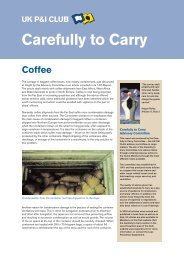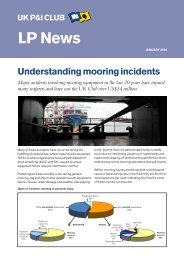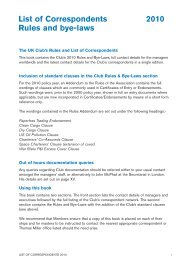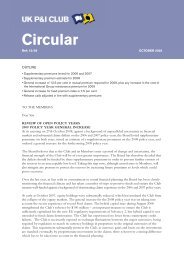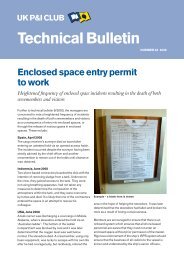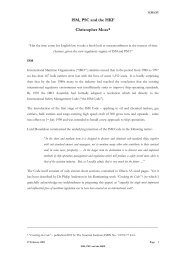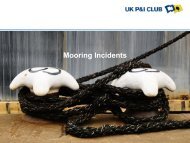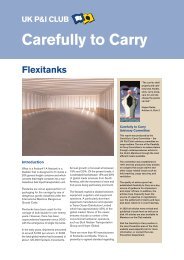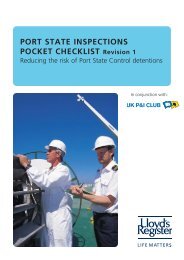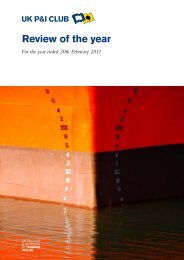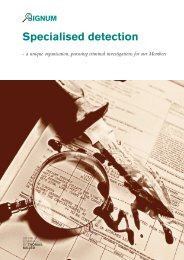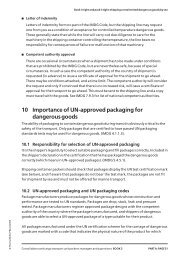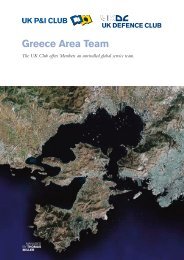Biofuels - UK P&I
Biofuels - UK P&I
Biofuels - UK P&I
Create successful ePaper yourself
Turn your PDF publications into a flip-book with our unique Google optimized e-Paper software.
not under a positive pressure of dry inert gas. Despite<br />
having relatively high flash points, FAME cargos are<br />
generally carried under a (dry) nitrogen blanket in order<br />
to avoid the potential increase in water due to<br />
absorption of moisture from tank ullage spaces.<br />
FAME very sensitive to water contamination. The<br />
current maximum allowable water content in the<br />
European EN 14214 and American ASTM D6751 FAME<br />
standards is 500 mg/kg, although often selling<br />
specifications are lower (300 mg/kg being a typical<br />
maximum water content on a sales specification),<br />
reflecting the high potential for water pick-up in this<br />
material.<br />
Unlike most conventional diesels, in which any undissolved<br />
water present will generally settle out over a<br />
period of time, FAME can hold water in suspension up<br />
to relatively high levels (above 1000 mg/kg). Apart from<br />
the fact this will render the cargo off-specification for<br />
water content, the presence of water can promote<br />
unwanted hydrolytic reactions, breaking down the<br />
FAME to form free fatty acids, which can again affect<br />
certain specification parameters for the material – such<br />
species are corrosive and may attack exposed metal<br />
surfaces. Additionally, once a certain threshold level of<br />
water content is reached, water can separate out from<br />
the FAME, forming a separate (and potentially<br />
corrosive) free water phase. The possibility of phase<br />
separation occurring is greater for blends of FAME and<br />
conventional diesel.<br />
The presence of a FAME/water interface provides ideal<br />
conditions for the promotion of unwanted<br />
microbiological growth, which may in turn lead to filter<br />
blocking and corrosion problems. Certain publications<br />
have referenced the greater degree of biodegradability<br />
of FAME as a positive factor when dealing with<br />
environmental spillages. This is indeed correct, but by<br />
the same token this factor means that FAME is<br />
considerably more prone to microbiological attack than<br />
a conventional fossil fuel, with the associated<br />
problems mentioned above. A number of studies have<br />
been performed in this area which highlight the need<br />
for further detailed analysis and research into the<br />
potential for serious microbiological contamination<br />
occurring at various stages in the biofuel supply chain.<br />
Possible sources of water contamination aboard a<br />
vessel range from the obvious – sea water ingress or<br />
residues of tank washing operations – to the less<br />
obvious – moisture in an inert gas blanket produced<br />
from a faulty flue gas generating system, or<br />
atmospheric humidity in tanks’ ullage spaces that are<br />
Stability problems: FAMEs are generally more prone<br />
to issues with regard to their stability than conventional<br />
petroleum diesel. We have mentioned previously that<br />
certain FAME/diesel blends can be oxidised to form<br />
unwanted degradation products and that the addition<br />
of antioxidants may prevent the formation of these<br />
sediments. FAME can degrade under the influence of<br />
air, heat, light and water, and degradation may occur<br />
during transport, storage or even during end-use. FAME<br />
cargoes may display different levels of stability<br />
dependent upon their<br />
composition and the<br />
feedstock(s) used in<br />
their production. In<br />
general FAME with<br />
higher levels of<br />
unsaturated fatty acids,<br />
such as soybean and<br />
sunflower oil derived<br />
FAME, will be less<br />
stable than those<br />
composed of higher<br />
levels of saturated fatty<br />
acids, for example, palm<br />
oil or coconut oil derived<br />
FAMEs.<br />
Potential shipping problems include the promotion of<br />
degradation reactions by trace metals (copper heating<br />
coils or zinc-containing tank coatings have the<br />
potential to cause deterioration in quality) and thermal<br />
stability issues if the FAME cargoes are stored next to<br />
heated tanks, for example, bunker settling tanks. Issues<br />
with the promotion of instability by the presence of<br />
trace metals are worse for B100 than for lower<br />
biodiesel blends (e.g. B5, B20). Degradation reactions<br />
can form insoluble sediments and gums, which may<br />
increase the viscosity of the FAME, lead to filter<br />
blocking or potentially further decompose to other more<br />
corrosive species. The carriage of FAME under dry<br />
nitrogen blankets can also help to prevent unwanted<br />
degradation reactions caused by the material coming<br />
into contact with air.<br />
Low temperature behaviour: The poor low<br />
temperature properties of FAME when compared to<br />
conventional diesel may give rise to issues where<br />
FAME cargoes are shipped through extremes of cold<br />
temperature. It is possible for certain FAMEs to form<br />
waxy precipitates at low temperatures which will then<br />
not re-dissolve when the product is reheated, although<br />
this would not appear to be a common problem.



